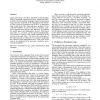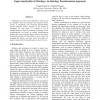130
click to vote
WIKIS
2006
ACM
15 years 8 months ago
2006
ACM
Wikis are social web sites enabling a potentially large number of participants to modify any page or create a new page using their web browser. As they grow, wikis may suffer from...
118
click to vote
WIKIS
2006
ACM
15 years 8 months ago
2006
ACM
Ontologies are consensual representations of a domain of discourse and the backbone of the future Semantic Web. Currently, however, only a fraction of Web users can take part in t...
104
Voted
SAC
2006
ACM
15 years 8 months ago
2006
ACM
In recent years, Web Services have become the key technology for building flexible and interoperable computing infrastructure. However, to realize the vision of a full-fletched ...
122
Voted
SAC
2006
ACM
15 years 8 months ago
2006
ACM
Traditional semantic web query languages support a logicbased access to the semantic web. They offer a retrieval (or reasoning) of data based on facts. On the traditional web and...
117
Voted
ELPUB
2006
ACM
15 years 8 months ago
2006
ACM
Among the new possibilities that the Semantic Web has enabled, the authoring task is considered as a key moment for semantic representation of knowledge to enhance publishing need...
110
Voted
ELPUB
2006
ACM
2006
ACM
Weaving the Web of Science. HyperJournal and the Impact of the Semantic Web on Scientific Publishing
15 years 8 months ago
In this paper we present HyperJournal, an Open Source web application for publishing on-line Open Access scholarly journals. In the first part (sections 1-3) we briefly describe t...
100
click to vote
ACMICEC
2006
ACM
15 years 8 months ago
2006
ACM
In this paper we present a proposal for representing soft constraint satisfaction problems (CSPs) within the Semantic Web architecture. The proposal is motivated by the need for a...
148
Voted
ADC
2006
Springer
15 years 8 months ago
2006
Springer
Query answering over OWLs and RDFs on the Semantic Web is, in general, a deductive process. To this end, OWL, a family of web ontology languages based on description logic, has be...
128
Voted
ICDE
2006
IEEE
15 years 8 months ago
2006
IEEE
Ontologies are used to give meaning to resources on the Semantic Web and therefore the Semantic Web’s success in integrating and providing interoperability between different sou...
134
click to vote
ICDE
2006
IEEE
15 years 8 months ago
2006
IEEE
This paper presents a description of seven systems, which use database technology to both represent knowledge persistently and make scalable queries on it, in the Semantic Web con...


